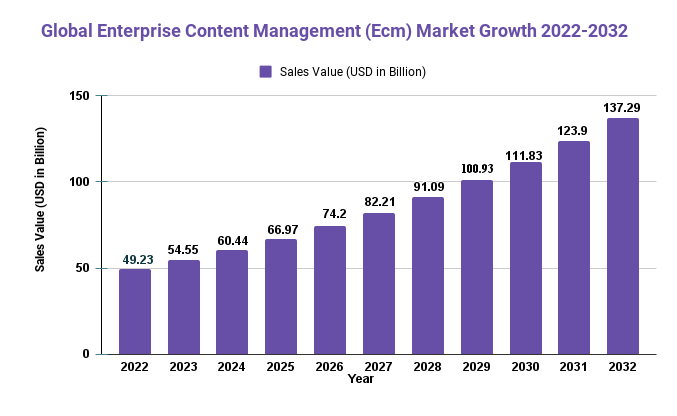Enterprise Content Management (Ecm) Market Revenue 137.29 Bn + Peer Group Analysis by 2032

Page Contents
Market Overview
Published Via 11Press: According to Market.us' report, the global Enterprise Content Management (ECM) market size is projected to grow from USD 49.23 billion in 2022 to USD 137.29 billion by 2032 at a Compound Annual Growth Rate (CAGR) of 10.8% over the forecast period.
According to Market.us, Enterprise Content Management (ECM) refers to the management of information throughout its lifecycle – from creation to destruction – in a way that allows organizations to optimize their business operations, reduce expenses and boost efficiency.
The growth of the ECM market can be attributed to its increasing adoption across various industry verticals, an ever-increasing need to manage data volume, and regulatory compliance requirements. Furthermore, efficient management of unstructured content such as images, videos, and social media content is another driving factor behind its expansion.
Want to Access the Statistical Data and Graphs, Key Player's Strategies | https://market.us/report/enterprise-content-management-ecm-market/request-sample
Key Takeaways
- The ECM market is rapidly growing in size and is expected to reach a global value of $104.5 billion by 2027, rising at an annual compound growth rate (CAGR) of 10.8% from 2020-2027.
- The ECM market has seen rapid expansion due to the increasing adoption of digitalization across various industry verticals, the need to manage an ever-increasing volume of data, and tightening regulatory guidelines.
- North America leads the ECM market due to its rapid adoption of digital technologies and the presence of several large enterprises.
- The Asia-Pacific region is expected to experience the highest growth rate during this forecast period due to an increasing focus on digital transformation and the growing adoption of cloud-based solutions in this region.
- Key players operating in the ECM market include IBM Corporation, Oracle Corporation, OpenText Corporation, Microsoft Corporation, Dell EMC, Adobe Systems Incorporated, Hyland Software Inc., Hewlett Packard Enterprise Development LP, M-Files Corporation, and Newgen Software Technologies Limited.
- These companies are investing in developing cutting-edge ECM solutions to stay abreast of their customers' constantly changing requirements and gain a competitive advantage in the market.

Regional Snapshot
- North America: North America is the largest market for ECM. This is due to the large adoption of digital technologies, the presence of a number of large corporations, and the growing demand for compliance solutions.
- Europe: An important market for ECM because of the need to manage enterprise content efficiently, data protection regulations, and the rising trend towards digitalization.
- Asia-Pacific: This is the fastest-growing market in ECM because of the increased focus on digital transformation and the increasing adoption of cloud-based solutions. There is also a rising demand for content management solutions across various industries.
- Latin America is a growing market for ECM because of the rising adoption of digital technologies and the trend toward a mobile workforce. It also requires efficient management of enterprise content.
- Middle East and Africa: This emerging market for ECM is due to the increasing adoption of digital technology, the need for efficient management, and the rising demand for regulatory compliance.
Drivers
- The growing adoption of digitalization across various industry verticals is fueling demand for ECM solutions. ECM helps organizations efficiently manage their digital content, which is becoming increasingly crucial in today's digital age.
- Data Volume Increase: Organizations are producing an ever-increasing amount of information, necessitating efficient management through ECM solutions.
- Regulatory Compliant Management: Organizations have faced increasingly stringent compliance requirements in recent years. Enterprise Content Management (ECM) solutions can assist organizations in meeting these obligations by giving them the necessary tools to manage content compliantly and legally.
- The growing trend towards mobile workforce: As more employees work remotely or on the go, organizations need to ensure they have access to their content no matter where it is stored. Enterprise Content Management (ECM) solutions can offer this kind of mobility for content storage and retrieval which is becoming increasingly essential in today's business climate.
- Collaboration is becoming an increasingly crucial aspect of success in today's business environment. ECM solutions offer organizations the necessary tools to facilitate better collaboration both internally and externally, providing organizations with the capacity to work more efficiently together.
- Growing Demand for Cloud-Based Solutions: Cloud-based ECM solutions are becoming more and more popular due to their flexibility, scalability, and cost-effectiveness. As a result, more organizations are adopting cloud-based ECM solutions.
Restraints
- High Implementation Costs: Adopting an Enterprise Content Management solution can be costly, particularly for small and medium-sized businesses (SMBs). This makes it difficult for these organizations to afford these programs.
- The complexity of ECM Solutions: ECM solutions can be complex and require extensive training and expertise to implement and utilize correctly, making them unsuitable for organizations with limited resources to invest in them.
- Data Security Concerns: As organizations increasingly move content to the cloud, security, and privacy issues may arise. This may cause companies to hesitate when adopting cloud-based ECM solutions.
- Lack of Awareness: Despite the growing significance of managing enterprise content, some organizations may still not be aware of the advantages of ECM solutions or how to utilize them effectively.
- Integration Challenges: Integrating ECM solutions with existing systems and workflows can present a formidable obstacle, particularly for organizations with complex IT environments. This makes it more challenging for these businesses to adopt ECM solutions.
- Lack of Skilled Professionals: Successful implementation and management of ECM solutions necessitate skilled personnel. However, due to a shortage in this area, organizations may find it challenging to adopt these solutions.
Opportunities
- Advancements made in AI and machine learning: The integration of AI and ML into ECM solutions is a way for organizations to automate their content managing processes, reduce manual labor, and improve efficiency.
- Content analytics in demand: Companies are producing more content. ECM solutions offer organizations the ability to analyze content and gain insights that will allow them to make better business decisions.
- Hybrid cloud solutions becoming more popular. Organizations are looking to balance the benefits and privacy of cloud computing. ECM solutions are able to provide companies with the flexibility, scalability, and privacy of cloud computing while also maintaining data security and privacy.
- Focus on industry-specific Solutions: ECM solutions will become more specialized. Vendors have an opportunity to develop solutions specific to different industries.
- Mobile content management becomes more important. Employees are working more remotely and need to manage their content on the go. ECM vendors should capitalize on this trend to provide solutions that enable mobile access to content.
- Social media and collaboration platforms are becoming more popular: ECM vendors can integrate their solutions with these platforms to provide organizations with a more integrated content management solution.
Challenges
- Competition Increased: The ECM market is becoming more and more crowded, with numerous new players entering the space. This makes it challenging for established players to maintain their market share and profitability.
- Rapidly evolving technology landscape: The technology landscape is constantly shifting, with new innovations and advancements appearing regularly. This makes it challenging for ECM vendors to stay abreast of all the latest trends and improvements.
- Data Privacy and Security Issues: As more organizations store their content in the cloud, data privacy and security issues have become more prominent. This makes it challenging for ECM vendors to persuade organizations to switch over to cloud-based solutions.
- Limited Budgets: Many organizations have limited resources for content management solutions. This makes it challenging for ECM vendors to sell their solutions to these organizations, especially if the solutions are costly or require significant upfront investment.
- Complex Customer Needs: Customers have increasingly complex requirements when it comes to content management, making it challenging for ECM vendors to develop solutions tailored to each customer.
- Compliance challenges: Compliance requirements are becoming more stringent in organizations, particularly in heavily regulated areas like finance and healthcare. ECM vendors might find it difficult to provide solutions that meet these industries' complex compliance requirements.
Inquire more or share questions if any before the purchase on this report at: https://market.us/report/enterprise-content-management-ecm-market/#inquiry
Key Market Segments
Type
- Records
- Images
- Web Pages
Application
- Communication
- Retail
- Transportation
Key Market Players included in the report:
- Communication
- Retail
- Transportation
- International Business Machines
- Hewlett Packard
- M-Files
- Microsoft
- Newgen Software
- OpenText
- Oracle
- Xerox
- Alfresco Software
- Hyland Software
Report Scope
| Report Attribute | Details |
| The market size value in 2022 | USD 49.23 Bn |
| Revenue forecast by 2032 | USD 137.29 Bn |
| Growth Rate | CAGR Of 10.8% |
| Regions Covered | North America, Europe, Asia Pacific, Latin America, and Middle East & Africa, and the Rest of the World |
| Historical Years | 2017-2022 |
| Base Year | 2022 |
| Estimated Year | 2023 |
| Short-Term Projection Year | 2028 |
| Long-Term Projected Year | 2032 |
Recent Developments
- June 2022 – Epicor, a leading provider of industry-specific enterprise software to aid business to grow, has announced the acquisition of Data Interchange, a UK-based provider of Electronic Data Interchange (EDI) cloud technologies, and managed services. With this acquisition, Epicor's presence in European markets is further increased through their portfolio of B2B integration technologies which help customers connect with businesses and trading partners, boost efficiency levels, and add value throughout the supply chain.
- March 2022 – Epicor, a provider of industry-specific enterprise software to aid businesses in growth, announced the acquisition of Grow Inc., an easy-to-use full-stack BI platform that empowers any user – from the boardroom to plant floor or warehouse – to make data-driven decisions through easy dashboard creation and interactive visualizations.
Frequently Asked Questions
Q: What is the market size of the Enterprise Content Management (ECM) market?
A: According to a report by Market.us, the global ECM market size is expected to grow from USD 49.23 billion in 2022 to USD 137.29 billion by 2032, at a Compound Annual Growth Rate (CAGR) of 10.8% during the forecast period.
Q: Who are the key players in the Enterprise Content Management (ECM) market?
A: The key players in the ECM market include Communication, Retail, Transportation, International Business Machines, Hewlett Packard, M-Files, Microsoft, Newgen Software, OpenText, Oracle, Xerox, Alfresco Software, and Hyland Software.
Q: How is the Enterprise Content Management (ECM) market segmented?
A: The ECM market can be segmented based on type(Records, Images, Web Pages), Application (Communication, Retail, Transportation), and region (North America, Europe, Asia Pacific, Middle East and Africa, and Latin America).
The team behind market.us, marketresearch.biz, market.biz and more. Our purpose is to keep our customers ahead of the game with regard to the markets. They may fluctuate up or down, but we will help you to stay ahead of the curve in these market fluctuations. Our consistent growth and ability to deliver in-depth analyses and market insight has engaged genuine market players. They have faith in us to offer the data and information they require to make balanced and decisive marketing decisions.



